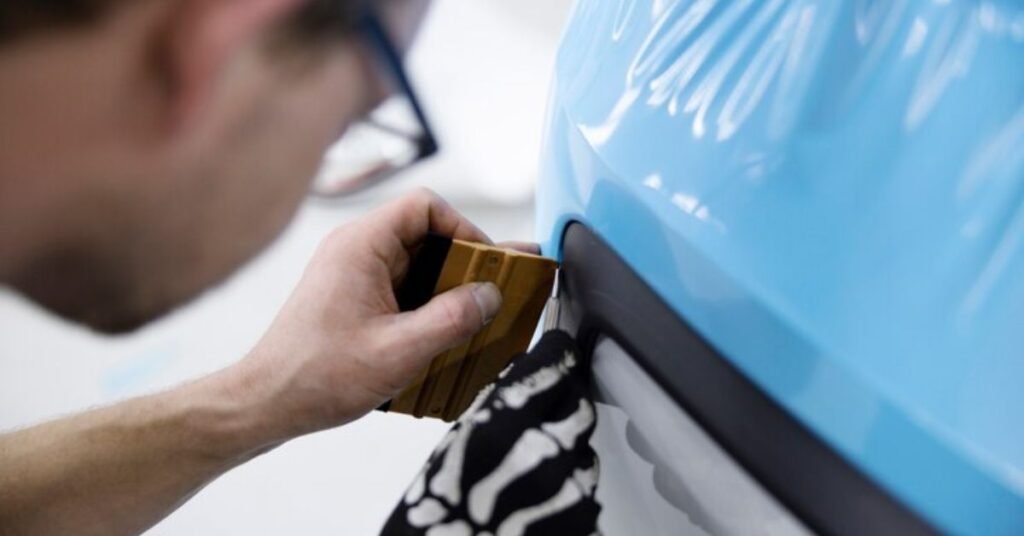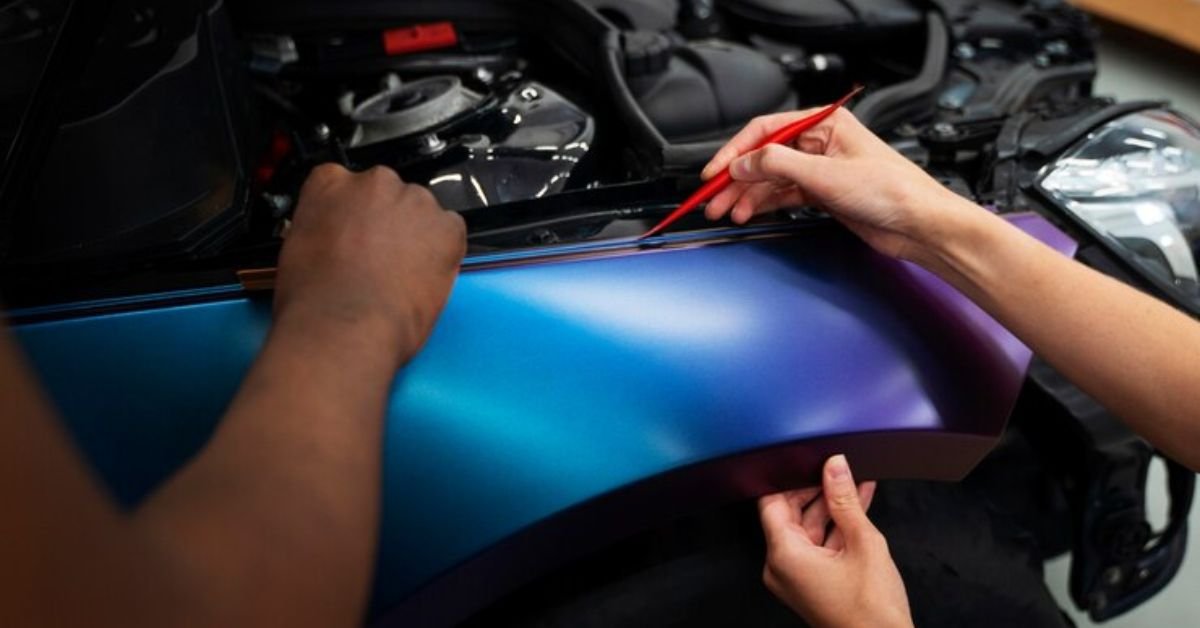Introduction
Car wrapping has become a popular alternative to traditional paint jobs. It allows vehicle owners to change their car’s appearance with less commitment and lower costs than a repaint. But, how much does it cost to wrap a car? The answer varies depending on several factors, including the type of wrap, vehicle size, and additional customizations.
This article will dive into the costs associated with car wrapping, the factors that influence pricing, the benefits of wrapping a car, real-world examples, and potential challenges to watch out for. By the end of this guide, you’ll have a clear understanding of how car wrapping works and whether it’s the right choice for you.
What is Car Wrapping?
Car wrapping is a process where vinyl film is applied to the surface of a vehicle. This film can come in a variety of finishes, colors, and designs, offering endless customization possibilities. Unlike painting, a car wrap is reversible, meaning you can remove it and restore the vehicle’s original look without any damage.
Key Concepts of Car Wrapping:
- Vinyl Film: The primary material used in car wrapping, available in different textures and finishes such as matte, gloss, and satin.
- Full Wrap vs. Partial Wrap: A full wrap covers the entire vehicle, while a partial wrap focuses on specific sections like the hood or roof.
- Wrap Lifespan: A high-quality wrap can last anywhere from 3 to 7 years, depending on maintenance and exposure to elements.
Car wrapping is often used for both aesthetic upgrades and practical purposes, such as protecting the car’s original paint.
Factors That Influence the Cost of Wrapping a Car
The cost of wrapping a car is determined by various factors, and understanding these elements can help you estimate the overall expense.
1. Vehicle Size
One of the most significant factors is the size of your vehicle. Wrapping a compact car will cost less than wrapping a large SUV or truck because more material is required for bigger vehicles.
- Compact Cars: These typically cost less to wrap due to their smaller surface area.
- Mid-Size Sedans: Wrapping these vehicles is moderately priced compared to compact cars and SUVs.
- SUVs and Trucks: These larger vehicles will cost more because they require more vinyl and labor.
2. Type of Vinyl Wrap
The type of vinyl wrap you choose also impacts the price. Vinyl wraps come in various finishes, and the cost can range from basic to premium.
- Glossy and Matte Finishes: These are often the most affordable options.
- Satin and Metallic Finishes: These mid-range options offer a unique look at a higher price point.
- Chrome and Carbon Fiber Finishes: These are the most expensive due to their advanced textures and visual effects.
3. Customization
Custom graphics, logos, or designs can significantly raise the cost of a car wrap. A custom wrap often requires additional design work and specialized installation, which increases labor costs.
- Basic Color Change: The most affordable option, changing the car’s color with a standard vinyl wrap.
- Custom Designs: More complex designs or company branding will require additional costs for design and installation.
- Detailed Work: Intricate patterns, gradients, or multi-colored wraps add to both material and labor costs.
4. Labor Costs
Labor is a crucial factor in the overall cost. Professional installation ensures a smooth, bubble-free application, but it can also be expensive.
- Professional Wrapping: This typically guarantees better results, as the installers are experienced in handling the material.
- DIY Wrapping: While cheaper, DIY car wrapping carries the risk of mistakes that may lead to costly repairs.
5. Geographic Location
The cost of wrapping a car can vary depending on your location. Areas with a higher cost of living tend to have more expensive labor rates, increasing the overall price of the wrap.
6. Additional Services
Additional services such as paint correction, surface preparation, and detailing may also raise the overall cost. If your car’s paint is in poor condition, it may need repairs before applying the vinyl wrap to ensure it adheres properly.
Typical Costs of Wrapping a Car
The price to wrap a car can vary significantly, but here are some typical price ranges:
- Compact Cars: $1,500 – $2,500
- Mid-Size Sedans: $2,000 – $3,500
- SUVs and Trucks: $3,000 – $5,000
- Custom Wraps: $5,000 and up, depending on the complexity of the design
It’s important to note that these are ballpark figures. Your actual cost will depend on the specific factors mentioned earlier.
Importance and Benefits of Wrapping a Car
Car wrapping offers several advantages, making it a popular choice among vehicle owners looking for customization without a permanent change.
1. Cost-Effective Alternative to Repainting
One of the most significant benefits of car wrapping is that it costs significantly less than a traditional paint job, especially for custom designs. A high-quality paint job can cost upwards of $10,000, while a wrap provides a similar aesthetic effect for a fraction of the price.
2. Protects the Original Paint
A vinyl wrap acts as a protective layer over your car’s original paint. This protection prevents scratches, UV damage, and minor abrasions from affecting the car’s surface. When you remove the wrap, the paint underneath is in pristine condition, which can help maintain the vehicle’s resale value.
3. Temporary and Reversible
Unlike paint, a car wrap can be easily removed or replaced. This allows you to change the color or design of your vehicle without making a permanent commitment. It’s ideal for leased vehicles or for those who like to change the look of their car frequently.
4. Wide Range of Customization
Wrapping offers endless possibilities in terms of design and color options. Whether you prefer a sleek matte black or a flashy chrome finish, the options are virtually limitless. You can also customize your car with unique graphics, logos, or text, which is ideal for businesses.
5. Faster Installation
A full paint job can take several weeks to complete due to the drying process between coats. In contrast, a car wrap can be installed in just a few days, making it a faster option for those who need a quick transformation.
Applications and Use Cases of Car Wrapping
Car wrapping is popular in various industries and personal scenarios, offering both aesthetic and functional advantages.
1. Personal Vehicles
For personal use, car wrapping allows owners to express their style without committing to a permanent paint job. Whether it’s a bold color change or a subtle matte finish, a wrap can make a car stand out on the road.
2. Commercial and Fleet Vehicles
Many businesses use vehicle wraps as a form of mobile advertising. Wrapping a fleet of company vehicles with branded logos, slogans, and contact information turns them into moving billboards. This form of marketing is cost-effective and can increase brand visibility. For more informative articles visit lorilong.
3. Motorsports
In motorsports, vinyl wraps are often used to display sponsors, logos, and custom designs. The flexibility of car wrapping allows racing teams to change the vehicle’s appearance quickly without the downtime required for a new paint job.
4. Protective Wraps
Clear wraps, known as paint protection films (PPF), are used to protect a car’s paint from rock chips, scratches, and environmental damage. These wraps are especially popular for high-end luxury cars or vehicles that are frequently exposed to harsh driving conditions.
5. Short-Term Changes
Wraps are also ideal for temporary changes, such as wrapping a car for a special event, promotion, or photoshoot. After the event, the wrap can be removed easily, returning the vehicle to its original state.
Challenges and Solutions of Car Wrapping
While car wrapping offers many benefits, there are also challenges to consider. Fortunately, most of these can be addressed with proper planning and maintenance.
1. Vinyl Durability
One common concern is the durability of vinyl wraps. While high-quality wraps can last several years, they may fade or peel in harsh weather conditions. To avoid this, it’s important to choose high-quality vinyl and have the wrap professionally installed. Proper maintenance, including regular cleaning and avoiding excessive sun exposure, will extend the wrap’s lifespan.
2. Cost of Removal
While car wraps are reversible, removing them can be costly, especially if the vinyl has been on the car for a long time. If not removed correctly, the wrap can damage the paint underneath. It’s recommended to have a professional handle the removal process to prevent any issues.
3. Paint Condition
The condition of your car’s paint affects the success of the wrap. If the paint is chipped or peeling, the wrap may not adhere properly, leading to an uneven finish. In such cases, paint correction or a repaint may be necessary before applying the wrap.
4. Not Completely Permanent
Although wraps can last for several years, they aren’t permanent. This may be seen as a disadvantage for those looking for a long-term solution, especially when compared to traditional paint jobs.
5. Limited Color Choices for Wrap Removal
If you frequently change wraps, you may find that your car’s original paint color limits your design choices. However, this can be mitigated by choosing neutral base colors, such as black, white, or gray.

Conclusion
Car wrapping offers a flexible, cost-effective alternative to painting, allowing vehicle owners to customize their cars without a long-term commitment. Whether you want to change the look of your personal vehicle, promote a business, or protect your car’s paint, the cost to wrap a car is generally more affordable and faster than a traditional paint job. However, factors like vehicle size, vinyl type, and customization options will influence the total cost.
If you’re considering wrapping your car, it’s essential to weigh the benefits and challenges and consult with professionals to ensure the best results.
FAQs
1. How long does a car wrap last?
A high-quality vinyl wrap typically lasts between 3 to 7 years, depending on exposure and maintenance.
2. Can I wrap my car myself to save money?
DIY wrapping kits are available, but professional installation is recommended for the best results and to avoid costly mistakes.
3. Does wrapping a car damage the paint?
No, a vinyl wrap actually protects your car’s original paint. However, improper removal can cause damage.
4. Is car wrapping cheaper than painting?
Yes, car wraps are generally more affordable than a high-quality paint job, especially for custom designs.
5. Can I wash my wrapped car?
Yes, you can wash a wrapped car, but it’s recommended to hand wash it to maintain the wrap’s condition. Avoid high-pressure washers as they may lift the vinyl.




